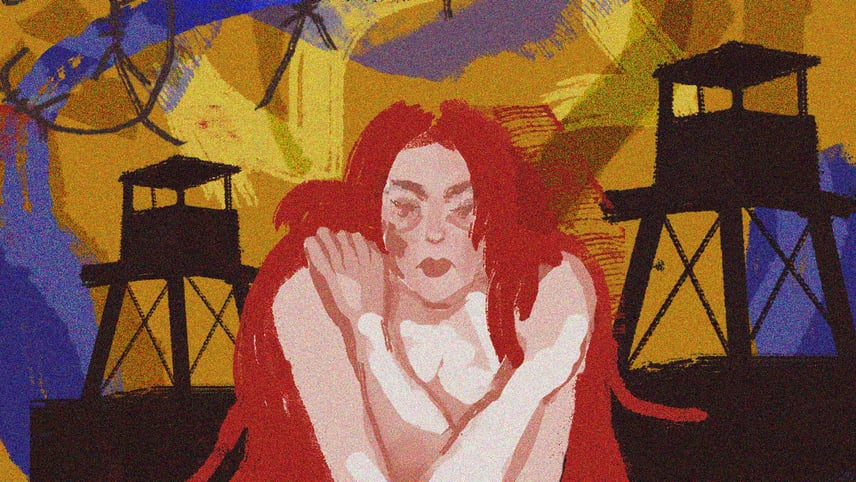Blackmail and Russian anthem on schedule. From the Gulag to the colony in Olenivka — women in Russian prisons (Part 2)

Russians torture and imprison people with an active pro-Ukrainian position, trying to erase their identity and break them psychologically. They did it decades ago, and they continue to do it today.
Hundreds of Ukrainian women, military and civilian, remain in Russian captivity. On October 17, Ukraine managed to return 108 of them as part of the exchange.
In this text, together with the researcher Oksana Kis, we compare two experiences: the memories of women who were political prisoners of the Gulag and the current testimonies of liberated Ukrainian women. Read the first part of the article here.
“She folded a sheet and sealed it with chewed bread, writing the address on top, and when our convoy led us to the station, she threw it into the crowd, shouting: "People, throw it in the box!"”
“In Valuyki, we were once allowed to write a letter. We thought that our letters would not reach. But they did — when I arrived, my mother said: "I knew you were alive!"” says Inha Chikinda, a marine released from captivity.
The right of prisoners to correspond with their families is enshrined in the Geneva Conventions. However, for some, a letter three months late was the only news from their captive relatives.
Sometimes Ukrainian women even managed to make a phone call from Russian captivity. A paramedic of the "Hospitallers", Tetiana Vasylchenko, soon after leaving Azovstal, called her daughter Kateryna and briefly said: “Have faith!”
“There was a possibility to a call in September, but its price and conditions were such that I, as a citizen of Ukraine, could not do it. It felt like a betrayal of the Motherland,” says Tetiana Vasylchenko.
Military medic Viktoriia Obidina tried to leave Azovstal together with her four-year-old daughter Alisa during the evacuation of civilians in early May. However, during the filtration mother and daughter were separated. Viktoriia was taken further for interrogation and later sent to captivity. Alisa, with Viktoriia's permission, was taken by a girl who also evacuated from the plant, Valeriia Zelenska. After arriving in Zaporizhzhia, the girl was taken by her grandmother.
Viktoriia was allowed to call home twice: once after she was forced to give an interview to a Russian TV channel, and again before the exchange, the day after her daughter's birthday.
“That's how my mother found out that I was held in Olenivka,” says Viktoriia.
Women in the Gulag were allowed to write two letters a year, but they could receive countless letters. When one of the female prisoners received a letter, it was an event for everyone in the barracks. The woman would read it out loud. But the Soviet authorities tried to prevent this by all means, so that the prisoners lost their sense of belonging to their community.
“I think that one of the ways to break a personality in the Gulag system was to try to remove a person from a familiar social environment, a cultural environment, so that they were atomized, lost, lonely, and had no connection with their community. They are a nobody, they do not belong to anything.
Restoring the connection with her community and family meant for the woman that she was not lost to them, symbolically did not die, that she is still a part of this community, belongs to this family, is remembered, she is considered only temporarily absent,” the researcher says.
Women prisoners sometimes asked civilian guards to send their letters home. Oksana Meshko, a Gulag prisoner, recalls her attempt to send a letter to her mother while being transported to the camp.
“I scribbled a few comforting words home to my mother on a scrap of paper, with a pencil stub (and this is a luxury, which you can get not during every transportation). I folded a sheet and sealed it with chewed bread, writing the address on top, and when our convoy led us to the station, I threw it into the crowd, shouting: "People, throw it in the box!" My first letter didn't arrive...”

“I could not help my family. It was destroying me from the inside”
“I was glad that Alisa was not around. I understood that I could be interrogated. And what else is needed: she would be pressed, so what mother would allow her child to be abused?” says Viktoriia Obidina.
Marine Inha Chikinda says that her biggest fear in Russia was that she could not help her family, neither morally nor physically: “At that moment I was powerless. It was destroying me from the inside”.
During interrogations, NKVD officers always used blackmail using relatives as one of the methods of manipulating prisoners and arrested women, says Oksana Kis.
“The NKVD quickly realized that women are especially sensitive to the fate of their loved ones: parents, children, brothers, or sisters. And blackmailing them, threatening to kill their relatives, was the easiest way to break them. Former underground women who found themselves in the clutches of the Soviet secret services painfully recall these terrible moments when they were demanded to testify in exchange for promising to release an elderly mother from arrest or not to send a child to an orphanage, but to allow relatives to raise the child while the woman was in the camp.
Family is a weak spot for women. This is due to the way they are brought up in our culture. From the very childhood, gender socialization targets women that the family is the most important and sacred, and, accordingly, the threat to the family is the worst thing.
When men are targeted that Ukraine is above all, the nation is above all, for women it turns out that mother, father, and child are above all.”
Larysa Zadorozhan recalled her stay in the Gulag: “It was hard, you work so hard during the day that you can't feel your arms or legs. And at night, you can’t sleep — you suffer, thinking "How is my son, how is my mother, what is with them, when will I see them? And will I see them?" You will suffer, you will not close your eyes all night. And in the morning back to work. No end in sight. For three years we lived in that barracks forgotten by God and people".

“Information isolation is one of the ways to break a person when they are not oriented in time or space, have no reference points”
“We watched Russian news and from there we could get information — because the angrier Skabeyeva and Solovyov were, the more hatred towards Ukraine they emanated, the more we understood that everything was not so bad,” says Liudmyla Huseinova.
“We were constantly told that Mykolaiv, Odesa, Zaporizhzhia, and Kharkiv are not ours. Every day we had to watch Russia-24. Several times they turned on YouTube reviews of bloggers,” says Maryna Holinko.
Watching the news on Russian TV channels was mandatory in the schedule of the captive women.
“Sometimes a Ukrainian wave broke through on the radio, but it was immediately switched off,” says Viktoriia Obidina.
“We could only hear the guards talking when they discussed that Ukrainian shell hit there. We were so happy,” says Tetiana Vasylchenko.
In the Gulag, the policy of information restriction was much stricter than it is now, says Oksana Kis. The women had no idea what was happening outside the camp, and even those excerpts of newspapers in which relatives could wrap a parcel from home were confiscated by the guards.
“Information isolation is one of the ways to break a person when they are not oriented in time or space and have no reference points. A person must exist in certain coordinates. And if they disappear, then it becomes very difficult to maintain your existence rationally.
Another thing is that modern executioners are less trained than the Gulag staff. Because they understood that political prisoners were able to "read between the lines": to interpret, to catch important messages even from the completely "sterile" Soviet press. Therefore, for political prisoners who were considered particularly dangerous, and who received longer sentences, any access to information was restricted. They did not even have access to Soviet propaganda newspapers or radio for years,” says Oksana Kis.
To receive information, women in the Gulag established relationships with some criminal offenders who were serving their sentences together with them. They asked civilian camp workers to send letters home, bypassing camp censorship. Prisoners also exchanged rumors among themselves.
“If someone managed to get any news, to find out any news, this information was instantly spread orally. And also through illegal correspondence with prisoners of other camps or zones, through notes that were left in common areas: in toilets, showers, places of work,” says Oksana Kis.

“Imprisonment is also a struggle”
Despite the information isolation and the attempts of the guards to psychologically break the detainees, the women still continued their struggle.
“We were told: "No one needs you", "Your family, Ukraine has abandoned you", "Besides, you are women, who will you be exchanged for". Sometimes it affected younger girls. But we did not let those doubts take hold and spread. Once we, 27 people in a cell for six, whispered the anthem of Ukraine. That's what kept us going,” says Tetiana Vasylchenko.
At the same time, the wardens of the colonies forced women to learn and sing Russian patriotic songs.
“We all had to comply with the regime. It was obligatory to sing the hymn in the morning after getting up. If any of the detention center staff didn't like it or if we forgot lyrics, they would say: "One more time". And we sang until they said: "Enough". We had a list of pro-Russian military songs that we had to sing.
If someone new was brought to the detention facility, we were also asked to sing the song "We are Russians". Men had to listen to us singing and learn it that way. And in the women's colony, girls had to sing songs and march like the military," says Viktoriia Andrusha.
Maryna Holinko recalls that during her captivity she learned about 20 Russian songs and 15 poems. All of them were on military topics.
“In the colony in Kursk, we were forced to sing the Russian anthem. At first, I had an internal protest. And then I decided for myself that there is nothing terrible — it's just a song that you have to sing and not think about anything else.”
Oksana Kis notes that this is how women continued their struggle, even when they were captured.
“What unites these two experiences, what maintains women’s spirit, did not allow them to give up, to despair, is a firm belief in their convictions. Faith in the cause to which they devoted themselves. The Soviet regime and the Gulag, as the embodiment of this repressive system, were the enemy of the members of the national underground who were sentenced to long years of captivity.
Women were aware that in captivity their strength in confronting the Soviet regime was unequal, but the struggle continued until they died. They saw their imprisonment in the Gulag as a continuation of this struggle. Until the system destroyed them physically or mentally (destroyed them as a person), their battle was not lost.
We now see the same in Ukrainian female prisoners, who, returning from there, still remain firm in their faith in Ukraine and their beliefs. They knew what they suffered for”.
In the text, we used the memoirs of female political prisoners of the Gulag, published in the monograph by Oksana Kis “Ukrainian Women in the Gulag: to Survive Means to Win”.
The text was published with the support of Mediaset.
- Share:
